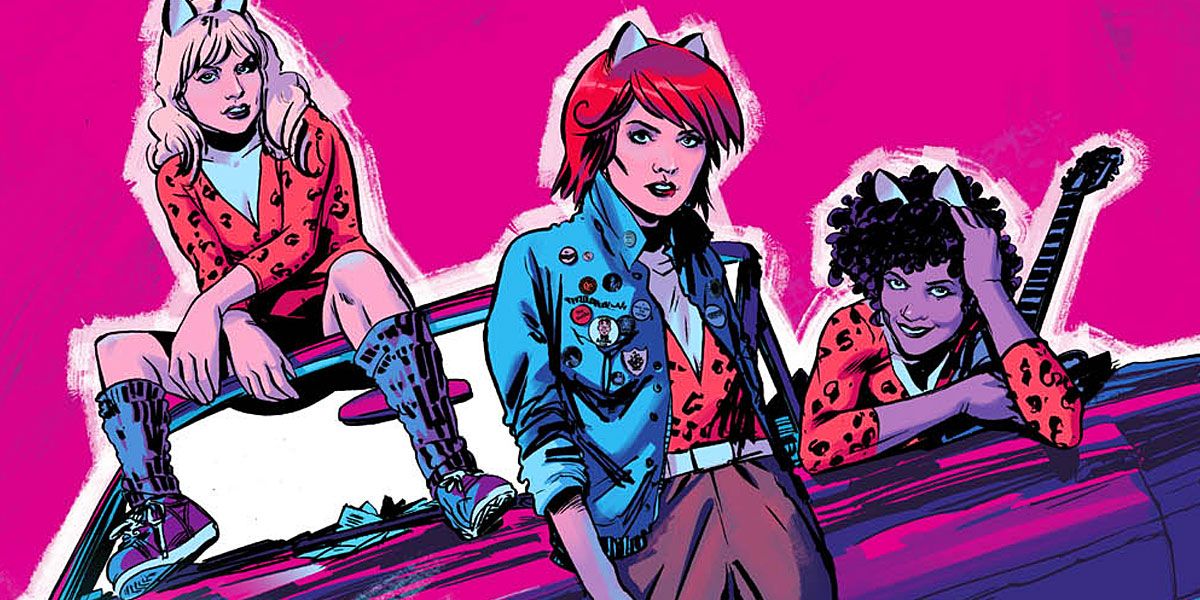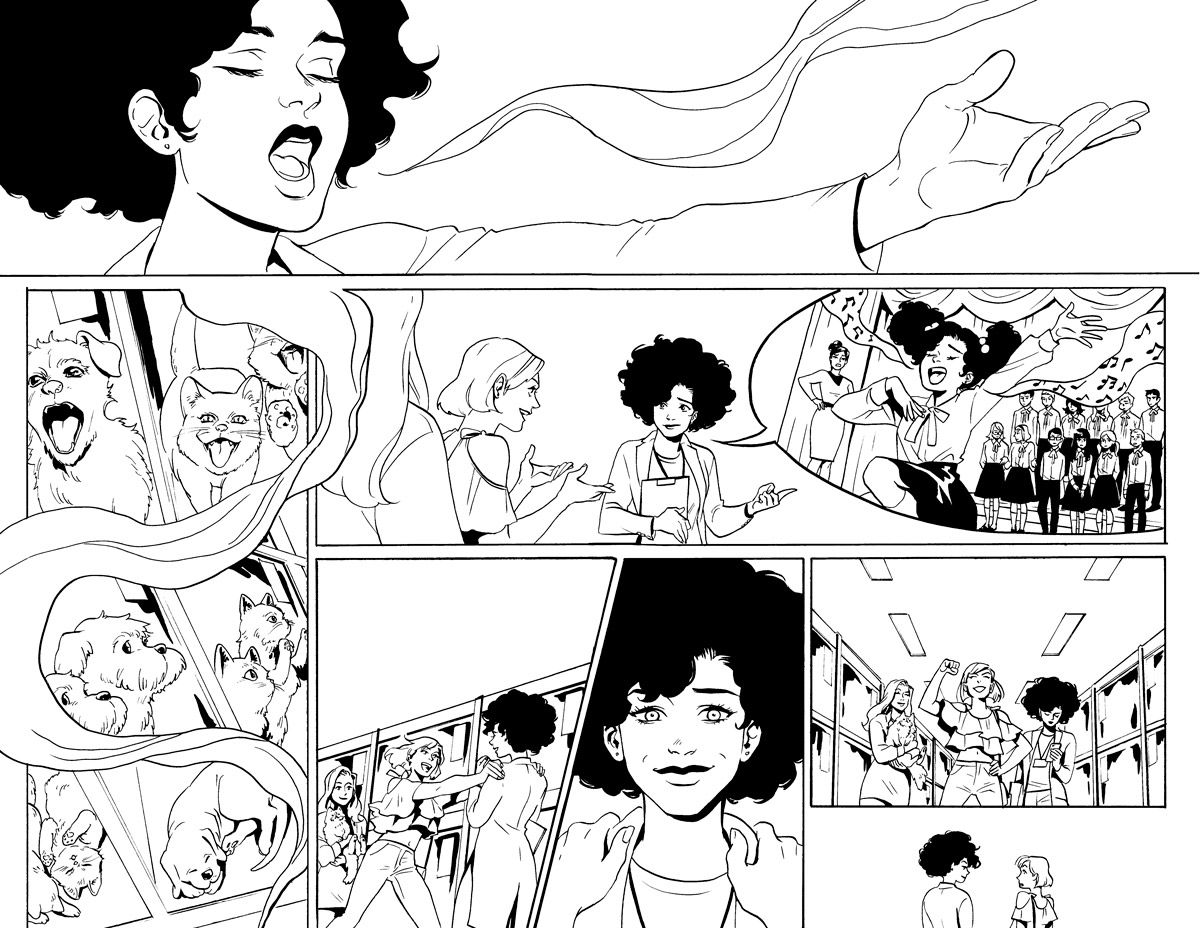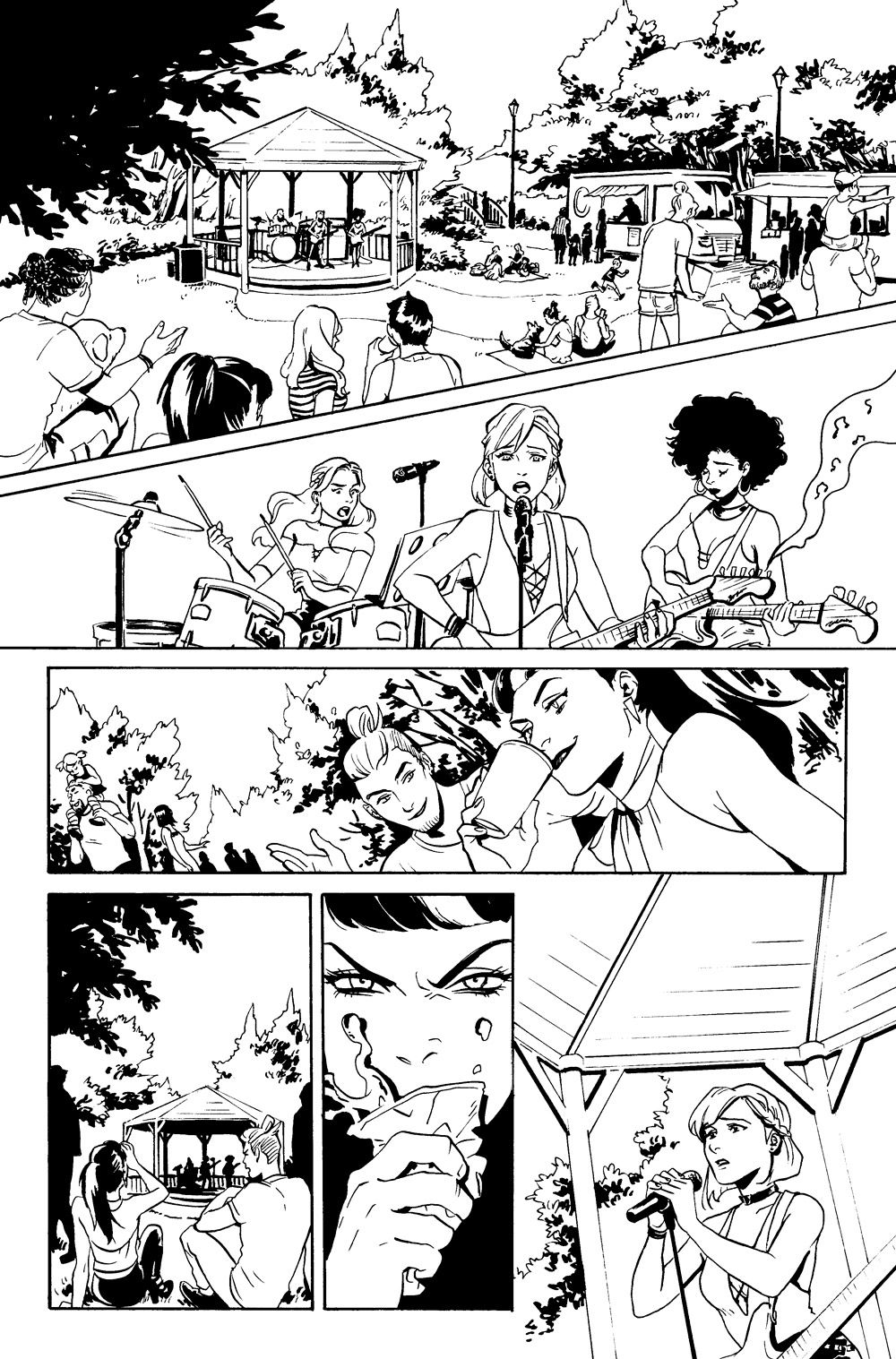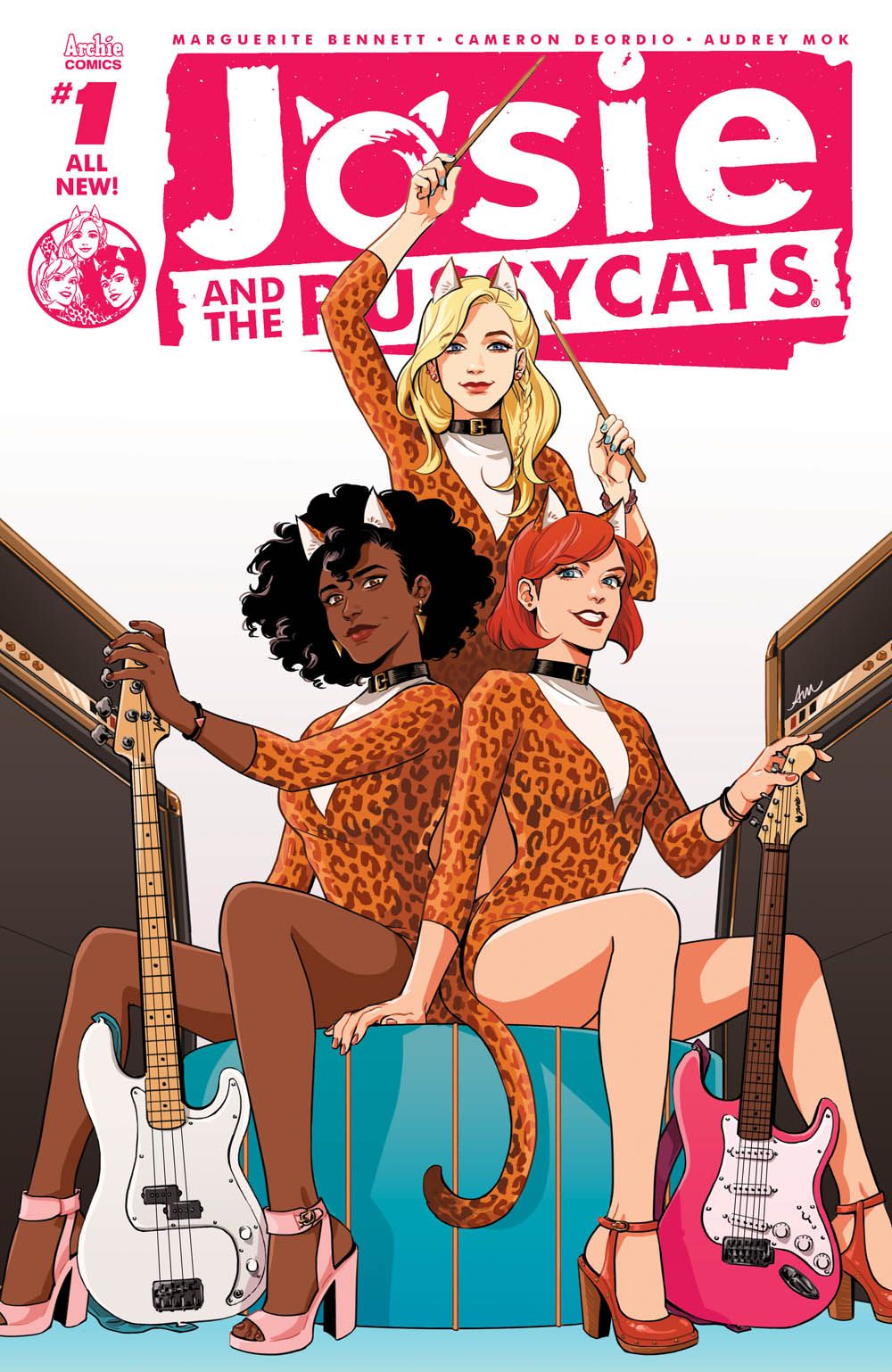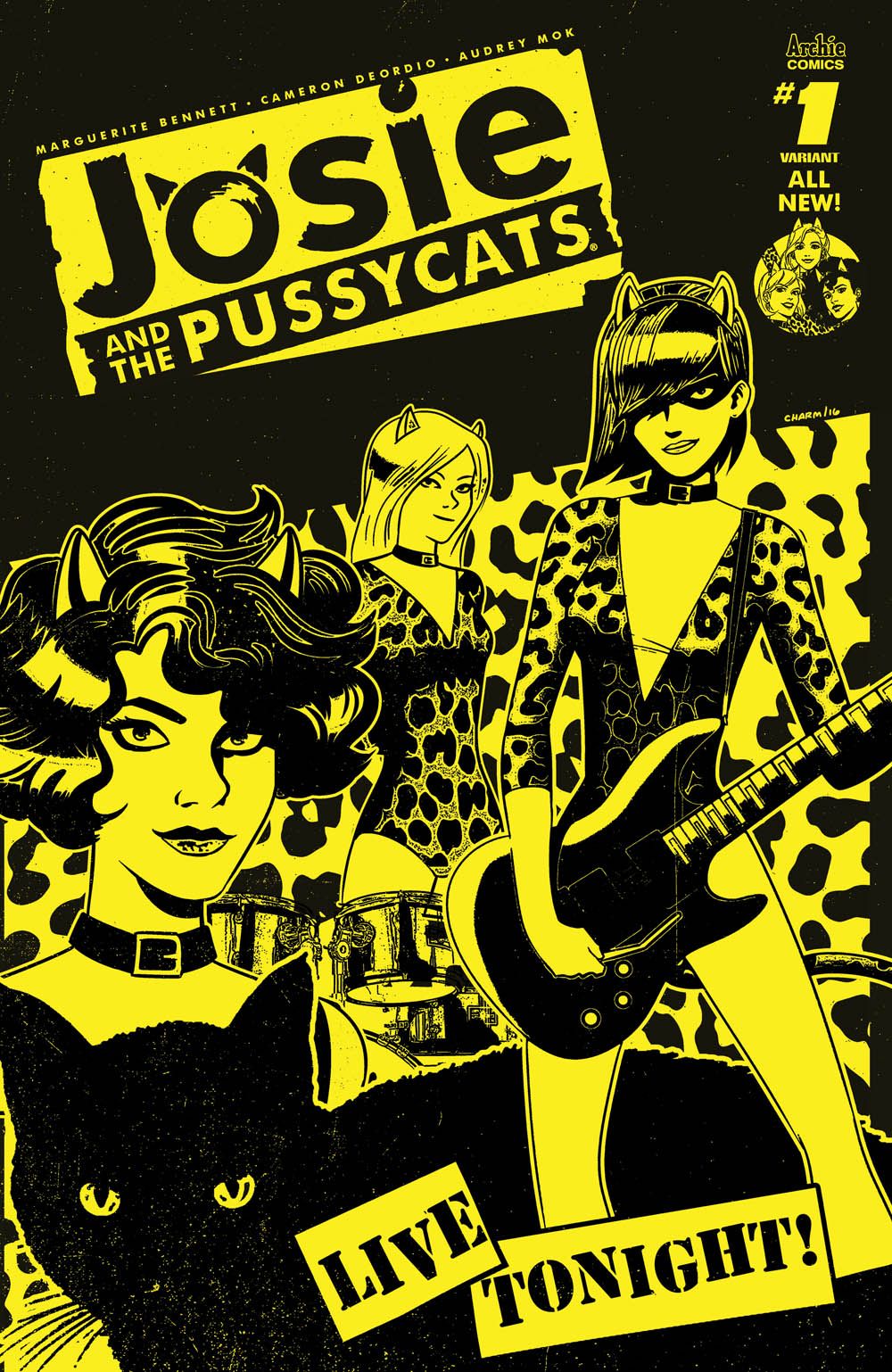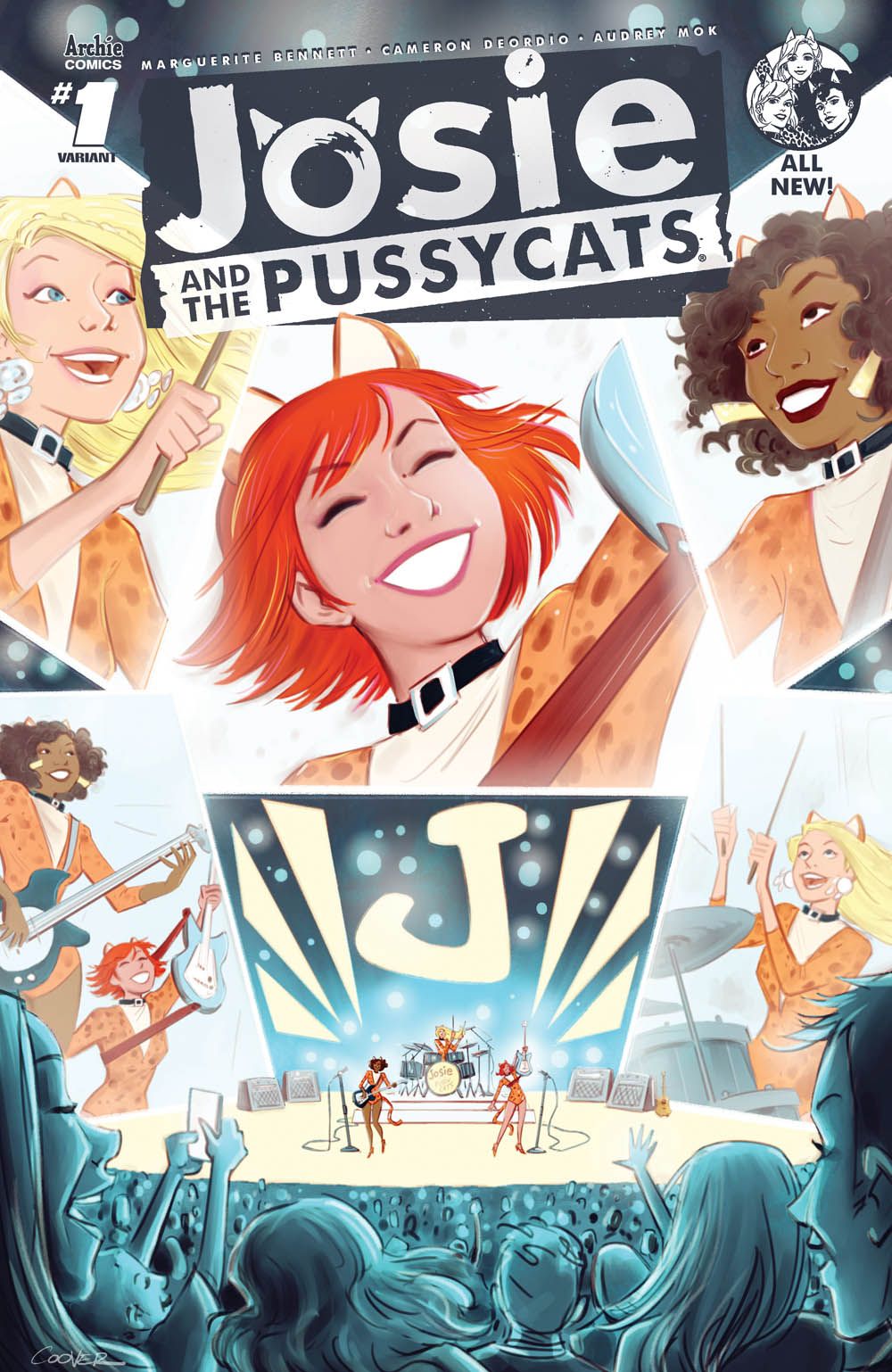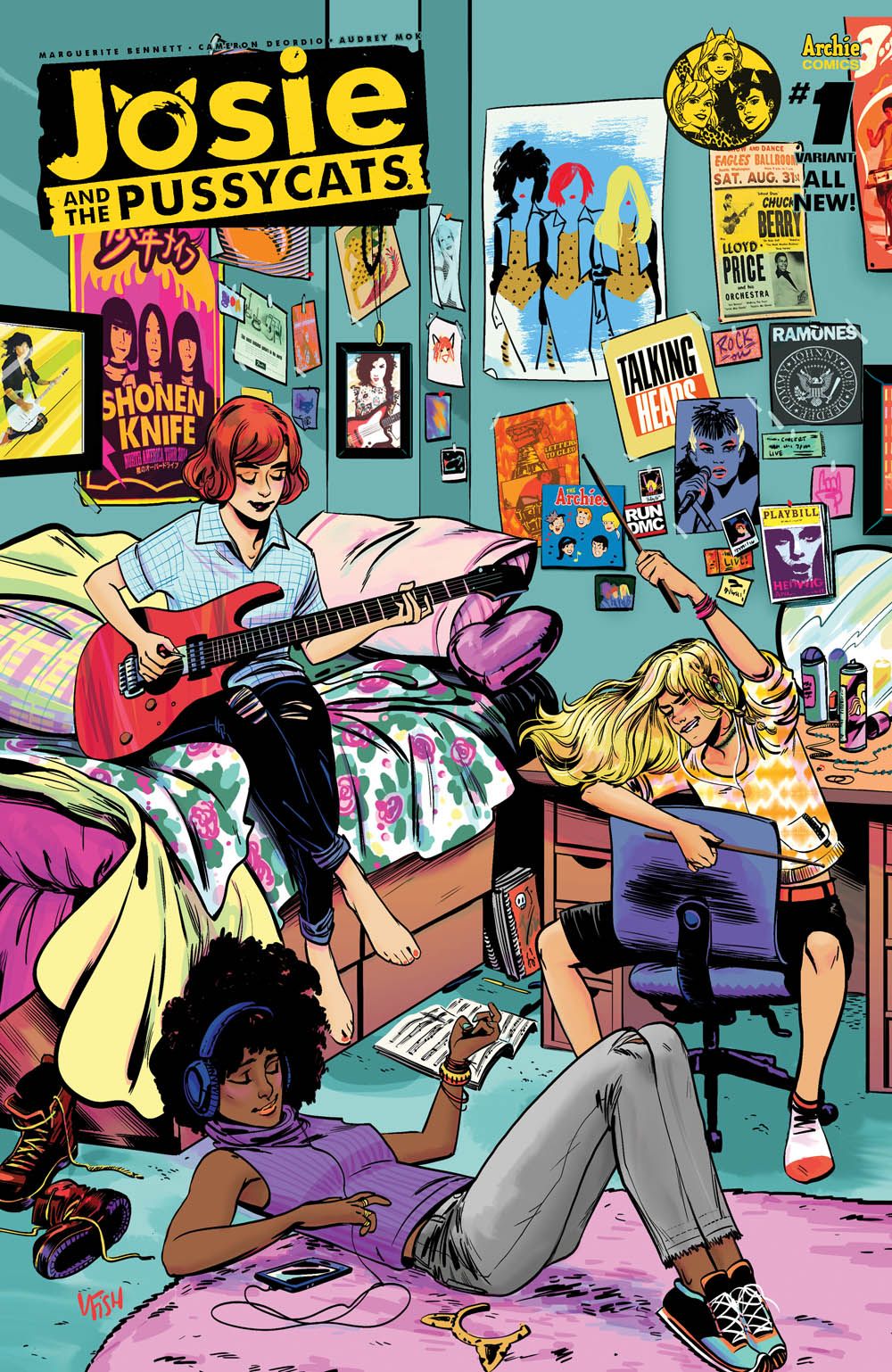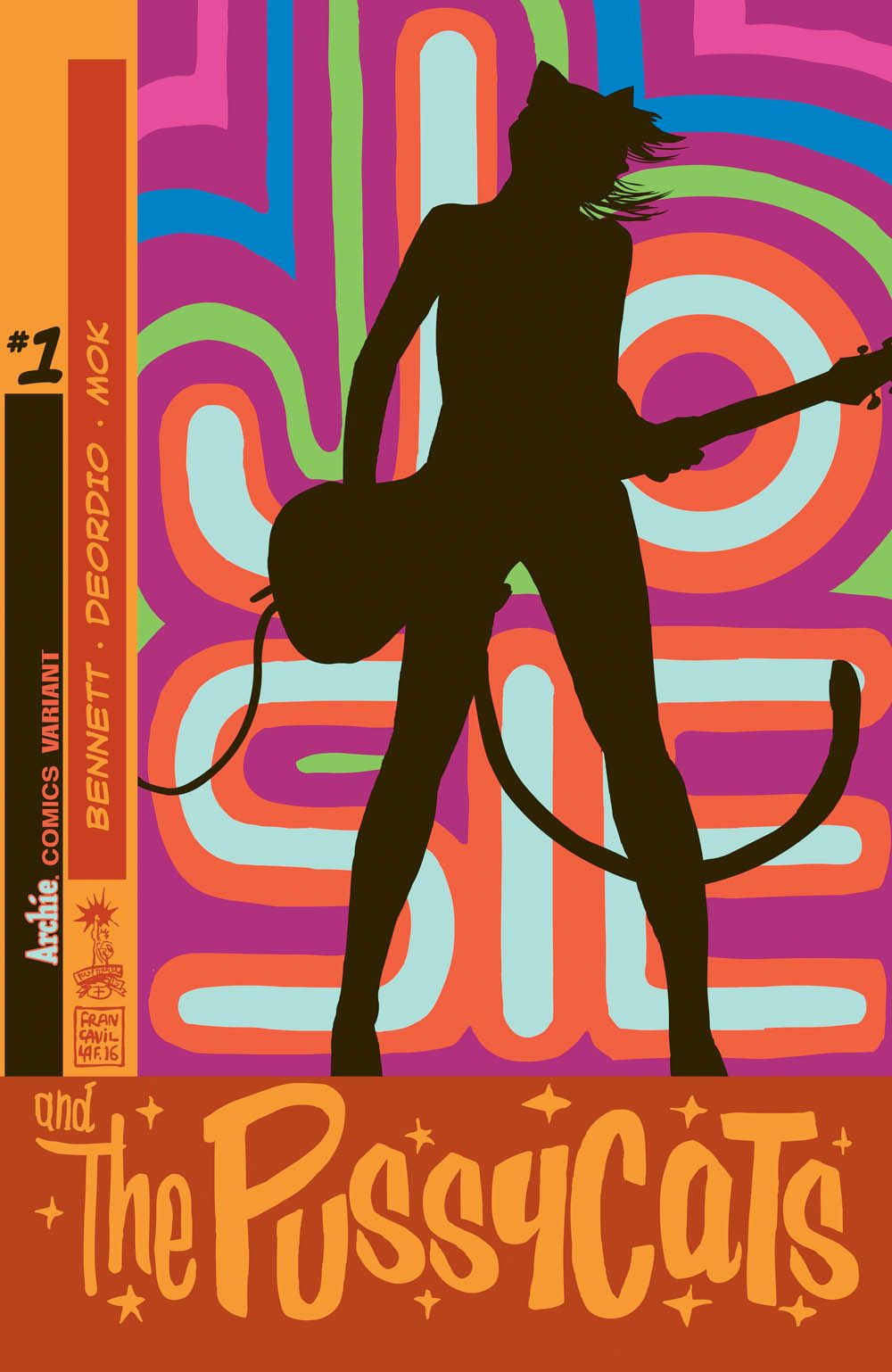Archie Comics broke the news last June that "Josie and the Pussycats" would be the latest ongoing comic series to update one of their legacy properties. The first issue is due out on September 28, and in anticipation, we spoke with the writing team of Marguerite Bennett ("DC Comics' Bombshells") and Cameron DeOrdio about what fans can expect from the new "Josie" -- and we have some samples of artist Audrey Mok's artwork as well!
CBR: Josie and the Pussycats have been through a lot of changes over the years. It sounds like your comic is going to go back to the beginning and show Josie and the Pussycats getting the band together for the first time and building their career from the start. Is that so, and if so, what do you like about that premise versus writing stories about an already established band?
Marguerite Bennett: First, thanks so much for covering the launch! We know we were not the only ones dying to see "Josie" return to the stands.
And yes! Issue one brings us Josie, Melody, and Valerie teaming up for the first time as musicians, and as friends. We really wanted to make sure that this story was fun, weird, and different, and that it was accessible for readers -- whether those are longtime Josie fans who aren't sure where continuity stands, or new readers who haven't ever been introduced to the grand, glorious, glamorous mess of the Pussycats.
Cameron DeOrdio: Starting at the beginning is such a great opportunity, because it gives us a chance to pare these characters down to what we see as their cores and then build on that in ways that -- we hope -- are interesting and fresh, while still staying true to who they are.
How much crossover will there be with the regular Riverdale characters? Is the Archie-Valerie romance still on?
Bennett: At the moment, our series is independent of the others, though that doesn't preclude future adventures!
What intrigued you about having the chance to write this series?
DeOrdio: I've always loved writing dialogue. Knowing that this is a book about friends who love one another and have a lot of chemistry, who banter with one another, was exciting to me. I like finding the perfect pithy line that matches the character, the moment and the story just right. Granted, sometimes the situation calls for a little more than pith (or a little less of mine), and landing that story beat, even without it, feels great, too. But this series provides a lot of opportunities to have fun with dialogue while still serving the greater story and its characters, so I'm incredibly grateful to be on board for that.
Bennett: The tone? Weirdly enough, our version of "Josie" is not all-ages, nor is it some monstrously hardcore run. Audrey's magnificent art is delightful, energetic, beautiful and fun, but our dialogue is definitely quick, crackling and -- hopefully -- goes over the young'uns heads in places. The girls are flawed, funny, earnest, and struggling to make their way in the world in their early 20s. We wanted outrageously over-the-top adventures that had genuine emotional crisis at their warm milk chocolate center.
What was your experience of "Josie" before coming to this series? Did you see the movie or read the comics?
DeOrdio: "Josie and the Pussycats" was my mom's favorite cartoon as a kid, so on the rare occasions there was a chance to catch an episode on TV, we'd be sure to watch. I absolutely adored the 2001 movie after catching it as a Blockbuster rental. I had a pretty anti-corporate attitude of the sort tweens sometimes have, I thought the jokes were clever and funny, and I had a pretty big crush on Rosario Dawson. It was the perfect storm.
Bennett: My mother still buys Archie comics at the grocery store. I was able to do decades of research on the series just from her back issues and digests alone!
How do the two of you work together?
Bennett: We were both students of Scott Snyder's in our MFA graduate program for creative writing at Sarah Lawrence College, and we've been editing each other's stories for four years at this point. When Archie approached me about the title, I knew immediately that I needed the funniest dialogue for this book to really be something special, and Cameron is hands down the funniest person I know. (Sorry, Chip.)
DeOrdio: Well, it would have been a lot easier if somebody hadn't moved across the country to L.A. But fortunately, Skype and Google Docs exist, so it's pretty simple to get on the line and work together on a script. Scheduling calls can be tough, but it's borderline impossible to overstate how helpful working together in real time is. If we were just sending static documents back and forth, a lot of the scenes or jokes we have in there now would never have come about, because we wouldn't have had the chance to talk them out as they coalesced in our heads. Also, this way, I can tell when a joke lands, because I can hear Marguerite laughing when she reads it. If I see her cursor pass by it without a sound, I try to rethink the line.
Marguerite, I heard you say at a panel that when you were growing up you identified more with villains than heroines because the villains had more freedom to be themselves. How do you feel about the Josie cast? Do they have more freedom--or are you more partial to Alexandra?
Bennett: That is 100% true.
One of the deciding factors in taking on "Josie and the Pussycats" was that Archie stressed for us that the book wasn't meant to be aspirational. The protagonists are growing and changing and struggling and butting heads--while getting involved in jetski chases, hoverboard explosions and biker kidnappings -- but none of them had to stand up and be role models. Josie, Melody, and Valerie allowed to screw up and try again and be better friends and better people. In the spirit of going back to the inception of the band, this is the girls figuring out how to become themselves.
That said, no one is in the right all the time, and no one is in the wrong all the time. I found it important to make everyone flawed and real--Josie and Alexandra included.
What sources or inspirations are you drawing on for Josie? How will your Josie be different from the Josie we know from the comics, the cartoon, the movie -- and the new "Riverdale" TV show?
DeOrdio: Our Josie is often strange and cartoony and occasionally self-aware. A big influence, from my point of view, is the "Scooby-Doo! Mystery, Inc.," cartoon that aired a couple years back. I'm almost afraid to mention it, because it was just so good that I don't want to risk the comparison. That show had such a great sense of fun, trying new things while honoring the original. That's what I want for our Josie.
Bennett: Quick shout-out for how stoked I am for the new TV Josie!
We're a bit "Mean Girls" meets "Archer." The dialogue is quick and pithy and true and mean, the art and aesthetic is gorgeous and to die for, and opulent, absurd adventures hold painfully real lessons about screwing up and trying to improve as a person.
Back in the 1960s, "dumb blonde" was a pretty common stereotype. Times have changed. How will you handle the character of Melody to make her resonate with modern readers?
Bennett: Haha, Melody might be our favorite character to write. Melody is a dumb blonde in the way a court jester is a fool--they're the ones who get to tell the truth and make everyone laugh and so live to tell the truth another day. Melody lives to her fullest, enjoys life on her own terms, and says exactly what is in her heart, and her friends are supportive of that. On behalf of dumb blondes, I salute her.
Right now Kevin Keller is the only openly gay character in Archie Comics. Have you considered bringing any LGBTQ characters to "Josie"?
Bennett: Haha, there are already queer characters in the book. We'll explore as we go along.
What sort of music do you think of your Josie and the Pussycats playing? How do your own tastes in music cross over with that?
DeOrdio: Ideally, I'd see them with a sort of Marina and the Diamonds lyrical sensibility with a bit of a rock edge to help match the whole three-piece band aesthetic. Marina's "The Family Jewels" is one of my all-time favorite albums. That said, my usual musical tastes are all over the place, but skewing more toward punk and metal, with some local New York acts sprinkled in. I listen to a ton of Dead Kennedys, Sleater-Kinney, Mischief Brew, Bikini Kill and Iron Maiden, but my Josie inspiration is more from the up-and-coming bands I get to see live here in the city, like The Hell Yeah Babies and The Fantastic Plastics.
Have you written any song lyrics for Josie and the Pussycats? If so, how do you get inspiration for that?
Bennett: Oh, holy God, Cameron is the genius behind the songs. I'm burned out from sticking songs in everything from "Bombshells" to "Insexts." He drives (and does so magnificently).
DeOrdio: Correct! Look upon my works, and so on!
No, but in all seriousness, Marguerite is being entirely too kind. A natural lyricist I am not, but I think we've got some fun songs in here. I try to draw inspiration from the songs that stick in my head once I've heard them and apply their melodies and structures to what I can come up with. Sometimes I take a look at a song I like, map out its meter, rhyme structure, consonance, assonance, all that, and look for ways to fit my song into those containers. I know it works because someone smarter and better than me already did the musical heavy lifting.
How is writing "Josie" different from writing a superhero comic in terms of pacing and plot? What is easier and what is more challenging?
Bennett: Oh, man, you don't burn through nearly as much real estate in fight scenes. Characters aren't allowed to solve their problems with hitting. Barring the odd Anka/McKelvie/Wada costume redesign in the superhero world, the fashions of Josie are better, though this is Audrey's credit.
DeOrdio: Can I answer this once I've published a superhero comic? [Laughs] But in all seriousness, we carry a lot of the same pacing mandates superhero comics--and, really, all serialized fiction--have, like establishing plot hooks to keep people going while also making panels, pages and issues feel complete in their own right. There's considerably less punching, though. There is at least one energy blast, so keep an eye out for that.
Bennett: The dialogue is definitely more of a challenge, but in the best possible way. We wanted the highest density entertainment for the readers. Every page is a wild ride, start to finish -- every panel has a beat, a laugh, something to put a smile on your face. In terms of legacy, this might be the most pressure I've been under since writing Batman. Damned if we won't make it worth your while.

